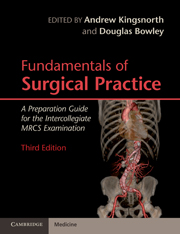Book contents
- Frontmatter
- Contents
- List of contributors
- Preface
- Section 1 Basic Sciences Relevant to Surgical Practice
- 1 Pharmacology and the safe prescribing of drugs
- 2 Fundamentals of general pathology
- 3 Fundamentals of surgical microbiology
- 4 Fundamentals of radiology
- Section 2 Basic Surgical Skills
- Section 3 The Assessment and Management of the Surgical Patient
- Section 4 Perioperative Care of the Surgical Patient
- Section 5 Common Surgical Conditions
- Index
- References
2 - Fundamentals of general pathology
Published online by Cambridge University Press: 03 May 2011
- Frontmatter
- Contents
- List of contributors
- Preface
- Section 1 Basic Sciences Relevant to Surgical Practice
- 1 Pharmacology and the safe prescribing of drugs
- 2 Fundamentals of general pathology
- 3 Fundamentals of surgical microbiology
- 4 Fundamentals of radiology
- Section 2 Basic Surgical Skills
- Section 3 The Assessment and Management of the Surgical Patient
- Section 4 Perioperative Care of the Surgical Patient
- Section 5 Common Surgical Conditions
- Index
- References
Summary
‘Disease is life under abnormal conditions and pathology is physiology contending the obstacles.’
Rudolf VirchowPathology is the scientific study of disease and represents a bridge between basic science and clinical medicine. General pathology introduces the essential concepts of disease and forms the basis for the understanding of systematic pathology and ultimately clinical medicine. It is not the aim of this chapter to provide a detailed account of the pathological processes and underlying molecular events. These are well described in general pathology text books. The purpose is rather to introduce the basic ingredients of pathology so as to better understand, diagnose and treat a wide spectrum of diseases.
Cell injury and death
Cell injury represents the initial trigger in a cascade of biochemical events which eventually manifests as disease. Injury is defined as an alteration in cell structure or function resulting from some insult that exceeds the ability of the cell to compensate through normal physiological adaptive mechanisms. The outcome will depend on the type, duration and severity of the injury as well as the type of cell and its physiological state. Reversible cell injury occurs when the cell's highly evolved healing process is able to restore normal cell function when the stimulus is removed. When the injury is too extensive to permit reparative responses, the cell suffers irreversible damage and dies. This can take the form of either necrosis or apoptosis.
- Type
- Chapter
- Information
- Fundamentals of Surgical PracticeA Preparation Guide for the Intercollegiate MRCS Examination, pp. 15 - 40Publisher: Cambridge University PressPrint publication year: 2011

